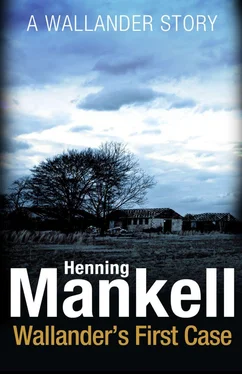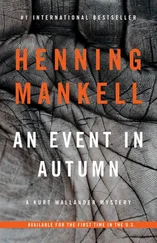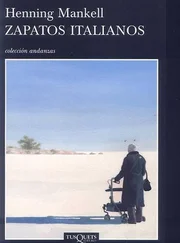Henning Mankell - Wallander's First Case
Здесь есть возможность читать онлайн «Henning Mankell - Wallander's First Case» весь текст электронной книги совершенно бесплатно (целиком полную версию без сокращений). В некоторых случаях можно слушать аудио, скачать через торрент в формате fb2 и присутствует краткое содержание. Год выпуска: 0101, ISBN: 0101, Издательство: Random House, Жанр: Полицейский детектив, на английском языке. Описание произведения, (предисловие) а так же отзывы посетителей доступны на портале библиотеки ЛибКат.
- Название:Wallander's First Case
- Автор:
- Издательство:Random House
- Жанр:
- Год:0101
- ISBN:9781473520721
- Рейтинг книги:4 / 5. Голосов: 1
-
Избранное:Добавить в избранное
- Отзывы:
-
Ваша оценка:
- 80
- 1
- 2
- 3
- 4
- 5
Wallander's First Case: краткое содержание, описание и аннотация
Предлагаем к чтению аннотацию, описание, краткое содержание или предисловие (зависит от того, что написал сам автор книги «Wallander's First Case»). Если вы не нашли необходимую информацию о книге — напишите в комментариях, мы постараемся отыскать её.
Wallander's First Case — читать онлайн бесплатно полную книгу (весь текст) целиком
Ниже представлен текст книги, разбитый по страницам. Система сохранения места последней прочитанной страницы, позволяет с удобством читать онлайн бесплатно книгу «Wallander's First Case», без необходимости каждый раз заново искать на чём Вы остановились. Поставьте закладку, и сможете в любой момент перейти на страницу, на которой закончили чтение.
Интервал:
Закладка:
‘And you were there fighting during the demonstration?’
Wallander finally got it. She had recognised him even though he was not in uniform.
‘I didn’t hit anybody,’ he answered.
‘Does it really matter who was holding the baton? You were there. Therefore you were fighting against us.’
‘You did not comply with the regulations regarding public demonstrations,’ Wallander said and heard how inadequate the words sounded.
‘I really hate the police,’ she said. ‘I was going to have a cup of coffee here, but now I’m going somewhere else.’
Then she was gone. The waitress behind the counter gave Wallander a stern look. As if he had cost her a guest.
Wallander paid and walked out. The sandwich was left half eaten. The incident with the girl had left him considerably shaken. As if he were wearing his uniform after all, not these dark blue pants, light shirt and green jacket.
I have to get away from the streets, he thought. Into an office, into case-review meetings, crime scenes. No more protests for me. Or I’ll have to take sick leave.
He started to walk faster. Considered whether or not he should take the bus to Rosengard. But he decided he needed the exercise – and also to be invisible and not bump into anyone he knew.
But naturally he ran into his father outside the People’s Park. He was weighed down by one of his paintings, wrapped in brown paper. Wallander, who had been walking with his head down, spotted him too late to make himself invisible. His father was wearing a strange cap and a heavy coat, underneath which he had on some kind of tracksuit and trainers without socks.
Wallander groaned to himself. He looks like a tramp, he thought. Why can’t he at least dress properly?
His father put the painting down and took a deep breath.
‘Why aren’t you in uniform?’ he asked, without a greeting. ‘Aren’t you a cop any more?’
‘I’m off work today.’
‘I thought policemen were always on duty. To save us from all evil.’
Wallander managed to control his anger.
‘Why are you wearing a winter coat?’ he asked instead. ‘It’s twenty degrees Celsius.’
‘That’s possible,’ his father answered, ‘but I keep myself healthy by sweating as much as I can. You should too.’
‘You can’t wear a winter coat in the summertime.’
‘Then you’ll just have to get sick.’
‘But I’m never sick.’
‘Not yet. It’ll come.’
‘Have you even seen what you look like?’
‘I don’t spend my time looking at myself in the mirror.’
‘You can’t wear a winter cap in June.’
‘Just try to take it from me if you dare. Then I will report you for assault. I take it you were there and beat up those protesters?’
Not him too, Wallander thought. It’s not possible. He’s never been interested in politics, even when I have tried to discuss it with him sometimes.
But Wallander was mistaken.
‘Every reasonable person must distance himself from that war,’ his father declared firmly.
‘Every person also has to do his job,’ Wallander said with strained calm.
‘You know what I told you. You never should have become a policeman. But you didn’t listen. And now see what you are doing. Beating innocent little children over the head with a stick.’
‘I haven’t hit a single person in my entire life,’ Wallander answered, suddenly full of rage. ‘And anyway, we don’t use sticks, we use batons. Where are you going with that painting?’
‘I’m going to swap it for a humidifier.’
‘Why do you need a humidifier?’
‘I’m going to swap it for a new mattress. The one I have now is terrible. It makes my back hurt.’
Wallander knew his father was involved in unusual transactions that often involved many stages before the thing he needed finally ended up in his hands.
‘Do you want me to help you?’ Wallander asked.
‘I don’t need any police protection. You could, however, come over some night and play cards.’
‘I will,’ Wallander said, ‘when I have time.’
Playing cards, he thought. It is the last lifeline there is between us.
His father lifted up the painting.
‘Why do I never get any grandchildren?’ he asked.
But he left without waiting for an answer.
Wallander stood looking after him. Thought it would be a relief when his father moved out to Osterlen. So that he would no longer risk running into him by accident.
Wallander lived in an old building in Rosengard. The whole area was constantly under the threat of demolition. But he was happy here, even though Mona had said that if they married they would have to find another place to live. Wallander’s apartment consisted of one room, a kitchen and a small bathroom. It was his very first apartment. He had bought the furniture at auctions and various secondhand shops. There were posters on the wall depicting flowers and tropical islands. Since his father sometimes came for a visit, he had also felt compelled to hang one of his landscapes on the wall over the sofa. He had chosen one without a grouse.
But the most important thing in the room was the record player. Wallander did not have many records, and those he did own were almost exclusively opera. On those occasions when he had entertained some of his colleagues, they had always asked him how he could listen to such music. So he had also acquired some other records that could be played when he had guests. For some unknown reason many policemen seemed fond of Roy Orbison.
He ate lunch shortly after one o’clock, drank some coffee, and tidied up the worst of the mess while listening to a recording by Jussi Bjorling. It was his first record, scratched beyond belief, but he had often thought it was the first thing he would rescue in a fire.
He had just put the record on for a second time when there was a thump on the ceiling. Wallander turned down the volume. The walls in the building were thin. Above him lived a retired woman who had once owned a flower shop. Her name was Linnea Almquist. When she thought he was playing his music too loud she thumped on the ceiling. And he obediently turned down the volume. The window was open, the curtain that Mona had hung up fluttered, and he lay down on the bed. He felt both tired and lazy. He had a right to rest. He started to skim through a copy of Lektyr , a men’s magazine. He carefully concealed it whenever Mona was coming over. But soon he fell asleep with the magazine on the floor.
He was awakened with a start by a bang. He was unable to determine where it had come from. He got up and walked out into the kitchen to see if anything had fallen to the floor. But everything was in its place. Then he walked back into the room and looked out the window. The courtyard between the buildings was empty. A lone pair of blue worker’s overalls was hanging on a line, flapping a little in the breeze. Wallander returned to his bed. He had been torn from a dream. The girl from the cafe had been there. But the dream had been unclear and disjointed.
He got up and looked at his watch. A quarter to four. He had slept for more than two hours. He sat down at the kitchen table and wrote down everything he needed to buy. Mona had promised to buy something to drink in Copenhagen. He tucked the piece of paper into his pocket and closed the door behind him.
He ended up standing in the dim light of the hallway. The door to his neighbour’s apartment was ajar. This surprised Wallander because the man who lived there was extremely private and had even had an extra lock installed this May. Wallander wondered if he should ignore it but decided to knock. The man who lived alone was a retired seaman by the name of Artur Halen. He was already living in the building when Wallander moved in. They usually said hello to each other and occasionally exchanged a few words if they happened to meet each other on the stairs, but nothing more. Wallander had neither seen nor heard Halen receive any visitors. In the mornings he listened to the radio, in the evening he turned on the television. But by ten o’clock everything was quiet. A few times Wallander had wondered how much Halen was conscious of his evening visits, in particular the aroused sounds of the night. But of course he had never asked.
Читать дальшеИнтервал:
Закладка:
Похожие книги на «Wallander's First Case»
Представляем Вашему вниманию похожие книги на «Wallander's First Case» списком для выбора. Мы отобрали схожую по названию и смыслу литературу в надежде предоставить читателям больше вариантов отыскать новые, интересные, ещё непрочитанные произведения.
Обсуждение, отзывы о книге «Wallander's First Case» и просто собственные мнения читателей. Оставьте ваши комментарии, напишите, что Вы думаете о произведении, его смысле или главных героях. Укажите что конкретно понравилось, а что нет, и почему Вы так считаете.












